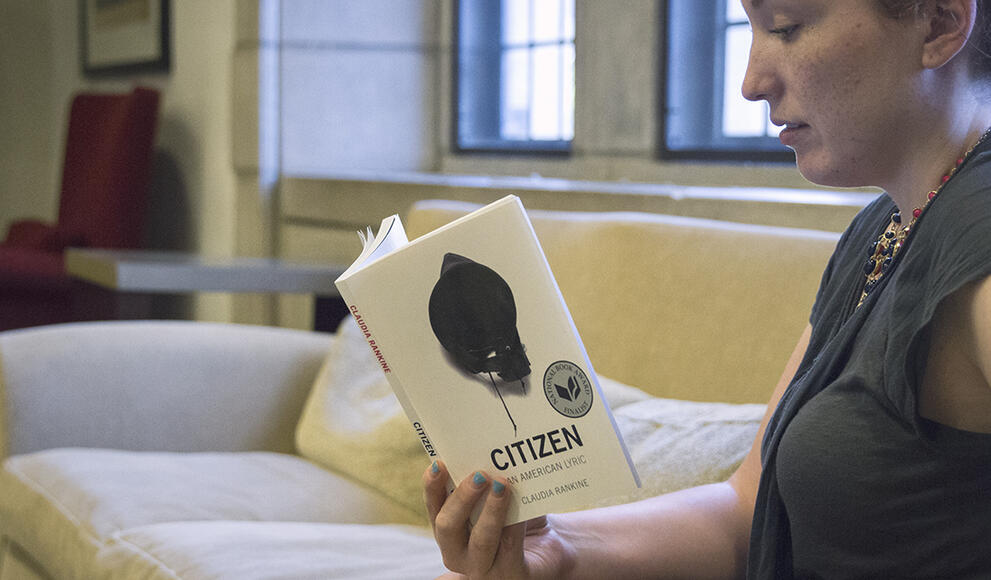Wellesley Faculty Members Share What They're Reading this Summer

Many of you may be passing the time as you eagerly count down to the start of the new school year with a good book. Maybe you’re one of the many people across the world digging into the new Harry Potter play Harry Potter and the Cursed Child, or maybe you’re looking for a recommendation. Here's what some of Wellesley's faculty are reading this summer:
Marjorie Agosin, Luella LaMer Slaner Professor in Latin American Studies and professor of Spanish: Paper Love: Searching for the Girl My Grandfather Left Behind by Sarah Wildman tells the powerful story of her grandfather’s epic escape from Nazi-occupied Austria and of the young woman he loved and left behind. After Wildman finds a trove of letters to her grandfather from “Valy” in a file drawer, she searches for this special woman who desperately sought a way to come to the United States for freedom and love. In the process, Wildman learns about Valy's exceptional life and her years in Nazi-occupied Europe. This book is a reminder to always be vigilant against tyranny and to honor the memories of those who could not survive the calamities of history.
James Battat, assistant professor of physics: "Is infinity a number?" My sister and I exchange texts like this. I ask her for medical advice (she’s an anesthesiologist), and I’m her go-to on all things mathy. I've been reading George Gamow’s book One, Two, Three…Infinity: Facts and Speculations of Science, a playful text that fueled my love of math and physics. I re-read chunks of it on a regular basis, and incorporate excerpts into my courses. Written in 1947 and updated in 1961, it’s full of mind-blowing ideas about mathematics, space, and time. For example, one can likely intuit that there are an equal number of odd and even numbers. But on page 17 of my Dover edition, Gamow shows that the infinity of counting numbers, both even and odd, is exactly as large as the infinity of even numbers alone! I hope my sister never learns about this book. If she does, I may never get a text from her again.
Barbara Beatty, professor and chair, Department of Education: I’ve just finished Jacksonland: President Andrew Jackson, Cherokee Chief John Ross, and a Great American Land Grab, by Steve Inskeep, a powerful, moving, and disturbing portrait of how the U.S. government took land from the Cherokees and other tribal groups in the southeast and forced them across the Mississippi River. My father’s family was from rural Tennessee, in the area that used to belong to the Cherokees, and I had heard about the Trail of Tears for many years. I also knew a bit about John Ross and the multiracial culture, constitution, and education system the Cherokees created in the early 19th century, in part from Native American students I’ve had in my courses. The book includes fascinating details of the long negotiations and conflict among Ross, Jackson, and others. Inskeep tells this quintessentially American story in all of its complexity, on both sides. His purpose is not to take sides, which students who take courses with me will know is one of my goals, too, but to show how complicated history and how we interpret and try to understand it is.
Stanley Chang, professor of mathematics: For the past five or six years I have been part of an Ancient Greek reading group. Our current project is to read every line of the 24 books of Homer’s Odyssey in Greek. Among the members of the group are professors emeritae Mary Lefkowitz (classical studies) and Maud Chaplain (philosophy), and Jonathan Tannenhauser, lecturer in mathematics. The Odyssey is a brilliant study on the construction of and delivery of narrative. We are currently finishing book 11, almost halfway! A slow reading of the work in the original language allows us to catch nuances in the text that we would have missed from a translation.
Robbin Chapman, associate provost and academic director of diversity and inclusion: My favorite reading this summer is Citizen: An American Lyric by the poet Claudia Rankine. I love how bravely and aesthetically she explores the poignant and visceral experiences of racial microaggression through a collection of poetic vignettes. Citizen has inspired me to reflect on how I can explore with others the shared burden and responsibility of racial injustice and race relations in the United States. My students will be reading excerpts from the book for my cross-listed education and computer science course "Learning and Teaching in a Digital World" class this fall.
David Teng Olsen, assistant professor of art: I'm pretty much reading only children's books these days. The big hits with my twin boys are Truck Driver Tom, Road Builders, We Help Mommy, Bread and Jam for Frances, Iggy Peck, Architect, and Blueberries for Sal. Kurt Vonnegut's Breakfast of Champions has been sitting on my nightstand for a couple of weeks now.
Please also check out the Wellesley Library Technology Services weekly feature "What's Wellesley Reading?" where faculty members introduce a book that they're passionate about in their field, and then read a brief passage. Archived episodes are available on the LTS website. The series resumes on September 7.
